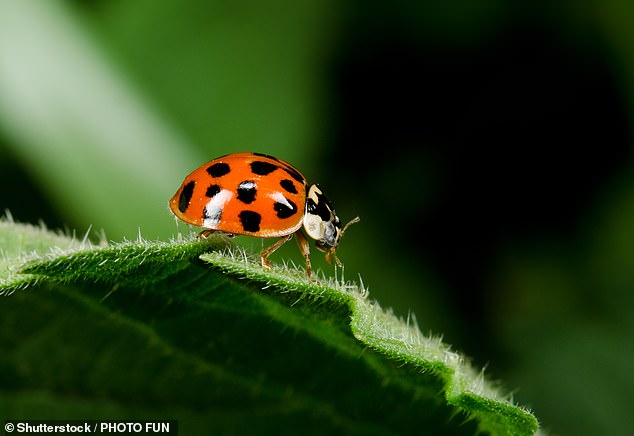The Chinese stink bug will devastate our gardens, plants and crops
Britain is facing an invasion by an army of insects from China that are destroying garden plants and crops, scientists have warned.
Officials intercepted and destroyed several consignments of trees at the Sevington internal border control in Kent last month after being infected with a harmful fruit pest.
But the brown-winged cicada, which attacks 200 plant species including apple and peach trees by feeding on their sap, will ‘inevitably’ reach Britain, experts say.
The pest, Pochazia huntungensis, joins the brown marmorated stink bug and box tree caterpillar as invasive insects native to China and East Asia, feared to wreak havoc here.
The stink bug, sometimes called the ‘fart bug’ because it emits a terrible stench when it invades homes, also ruins fruit crops and is now being found in increasing numbers in Britain.
And the caterpillar, which was first found in gardens in the south east in 2011, is already a major problem, destroying valuable topiary and box hedges as it spreads across Britain.
The brown-winged cicada joins the brown marmorated stink bug (pictured) and the box tree caterpillar, while invasive insects from China and East Asia are feared to wreak havoc here
Thanks to global trade, exotic insects are increasingly hitching a ride on imported plants to the US and Europe, eventually ending up in Britain, where they can thrive thanks to climate change.
Entomologist Max Barclay, senior curator of beetles at London’s Natural History Museum, said: ‘As globalization has increased, we also have global pests and diseases.
‘Covid followed the same route from China.
‘And the pests that are native to China and East Asia are much more harmful in Europe because the natural enemies and parasites do not touch them as often and they can build up a population.
‘They are unfamiliar with birds and worms here who look at it and think they don’t want to eat it.’
Mr Barclay highlights the harlequin ladybird, which is native to China and Japan.
The species arrived in Britain in 2004, probably via the United States, where it was introduced to control aphids that fed on crops and spread like wildfire.
It multiplied just as quickly across Britain and within a decade was the most common species of ladybird both here and in the US.

In the photo: the harlequin ladybird, native to China and Japan
The brown-winged cicada, which previously decimated apple orchards in China, South Korea and Japan, has become established in parts of France and Italy in recent years.
In 2022, the pest was found in the Italian province of Pistoia in Tuscany, home to nurseries that import plants from Asia.
Affected plants included citrus, fig and olive trees, vines and roses.
The eight consignments stopped at Sevington, near Ashford, included plants from Pistoia.
Trucks carrying them were held for more than a week while their cargo was tested in laboratories by the Food and Environment Research Agency.
Once the presence of the pests was confirmed, destruction notices were issued for all shipments.
Mr Barclay said: “I know it sounds defeatist, but I don’t think we’re going to keep these things out.
‘We find the brown marmorated stink bug here in larger numbers every year. In ten years it could be anywhere.
‘The plant health people are holding up the shipments, but Pochazia Huntungensis will get here, in something like a camper, if not in other shipments of trees.
‘And then it could be a threat, because if it can survive in Italy, it can probably survive here, where it gets warmer.
‘It sucks sap and causes spots or affects the vitality of the tree, which can be very damaging to commercial crops.

The Department for Environment, Food & Rural Affairs (Defra) warns that the cicada has a ‘high dispersal capacity’ and could likely survive in warmer areas of Britain
“Once these things get a foothold, they can establish themselves quite quickly. We have seen this before with invasive species, such as the harlequin ladybird, which is now found everywhere.’
The Department for Environment, Food & Rural Affairs (Defra) warns that the cicada has a ‘high dispersal capacity’ and could likely survive in warmer areas of Britain.
It says protecting the UK’s biosecurity is a ‘key priority’ and that robust controls have prevented the pest from entering the country.
A Defra spokesperson said: ‘Physical checks play an important role in preventing harmful plant and animal diseases from reaching our shores, as evidenced by the detection of non-native plant pests found in these shipments.’
The post-Brexit border checkpoint system came into force in April with new checks on plant and animal products entering the UK from the EU.
Garden centers and nurseries are warning that plant and flower exporters from mainland Europe are turning their backs on supplies from Britain after repeated delays at the border due to ‘painful’ checks.
Defra added: ‘We aim to reduce barriers to trade and reduce red tape by striking a fair balance between business and biosecurity.’
